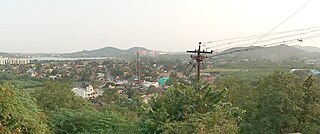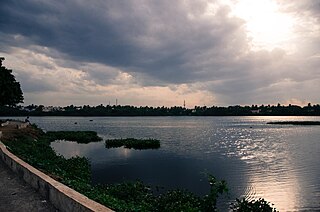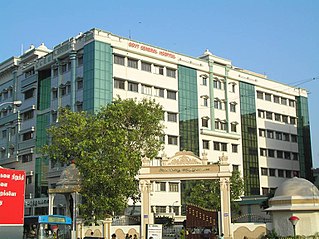| Type | Public |
|---|---|
| Established | 3 September 2005 |
Academic affiliations | Tamil Nadu Dr. M.G.R. Medical University, Department of AYUSH, Ministry of Health & Family Welfare, Government of India |
Administrative staff | 17 |
| Location | , , India 12°56′21″N80°07′42″E / 12.9391°N 80.1282°E |
| Campus | Urban |
| Website | www |
National Institute of Siddha is an institute for study and research of Siddha medicine. It was established in 2005 at Tambaram, Chennai, India. It is one of the eight national institutes established across nation, for training and research in "Indian Systems of Medicine and Homeopathy education", by Department of AYUSH, Government of India, [1]
It is affiliated to the government-owned Tamil Nadu Dr. M.G.R. Medical University and is also the national headquarters of the Central Council of Research in Siddha (CCRS), the exclusive body for Siddha research.
In the 7th five year Plan, the Government of India then decided to establish the National Institute of Siddha (NIS) at Chennai at an estimated cost of ₹ 470 million spread over a period of 6 years. [2] The proposal was approved, in principle, during the 9th Five Year Plan period and a society of NIS was registered in January 1999. [3] The capital cost of ₹ 360 million was shared by the Government of India and Government of Tamil Nadu in the ratio of 60:40 and the recurring expenditure of ₹ 110 million was shared in the ratio of 75:25. The foundation for the institute was laid on 27 March 1999. [3] The project was cleared in January 2002 and work started a year later. [4]
The institute was established by former union health Minister Dr. Anbumani Ramadoss and inaugurated on 3 September 2005 by Manmohan Singh, Prime Minister of India. [4]
Till 2010, the research council of Siddha was functioning under the CCRAS in New Delhi, which was established in 1978. In March 2010, the Ayush Department of the Union Health Ministry decided to bifurcate CCRAS to create an exclusive body for Siddha research called the Central Council of Research in Siddha (CCRS), after a long period of pressure from the Siddha community in Tamil Nadu and elsewhere. The new council was decided to be headquartered in Chennai, and the council was officially formed in September 2010.[ citation needed ]
The institute is located alongside the GST Road in Tambaram Sanatorium, about 6 km from Chennai Airport. The nearest railway station is the Tambaram Sanatorium Railway Station located about 100 m from the campus.[ citation needed ]
There is an attached hospital—Ayothidoss Pandithar Hospital, named after Ayothidasa Pandithar, a renowned traditional Siddha physician. There is an out-patient (OP) department where patients are treated free of cost. On an average, more than 1,500 patients are being treated in out-patient department every day. [5] [6] There is also an in-patient (IP) department with a capacity of 120 beds. [5]
The Ayothidoss Pandithar Hospital reported around 2,174 patients per day during 2017–18, up from around 700 patients per day in 2016. [7]
In 2010, the Archaeological Survey of India (ASI) declared the institute, (which is located on the remains of megalithic burials sites), as a protected monument, resulting in a ban imposed by the National Monuments Authority (NMA) on renovation or repairs of the existing buildings at the premises. [5]
In May 2018, foundation stone was laid for the construction of the Central Council for Research in Siddha's headquarters. The four-storeyed building will have a total area of 1,680 square metres. A new out-patient department block with 30 consulting rooms, 20 dispensing counters and 30 external therapy rooms, and an auditorium with a seating capacity of 500 will also be built. The total cost of all these was ₹316.5 million. [7]

Stanley Medical College (SMC) is a public medical college located in Chennai, Tamil Nadu, India. Though the original hospital is more than 200 years old, the medical college was formally established on 2 July 1938.

Tambaram is a city located within the Chennai Metropolitan Area in the Indian State of Tamil Nadu. The city is governed by Tambaram City Municipal Corporation.

Madras Medical College (MMC) is a public medical college located in Chennai, Tamil Nadu, India. Established in 1835, it is one of the oldest medical colleges in India, as well as in Asia.

Thiruneermalai is a neighborhood in the city of Tambaram, situated within the Chennai Metropolitan Area, Tamil Nadu, India.

Chitlapakkam is a residential locality located in Chennai Metropolitan Area governed by the Tambaram City Municipal Corporation. It is well known for its small, perennial lake and adjoining ecosystems.
Tambaram Sanatorium is a southern suburb of Chennai, India. Located between Chromepet and Tambaram, the neighbourhood is served by Tambaram Sanatorium railway station on the Chennai Beach–Villupuram section via Tambaram of the Chennai suburban railway.

Rajiv Gandhi Government General Hospital is a major state-owned hospital situated in Chennai, India. The hospital is funded and managed by the state government of Tamil Nadu. Founded in 1664 by the British East India Company, it is the first modern hospital in India. In the 19th century, the Madras Medical College joined it. As of 2018, the hospital receives an average of 12,000 outpatients every day.

Pallikaranai is a neighborhood and a residential area in south Chennai, Tamil Nadu, India. Located in proximity to the IT industry in Old Mahabalipuram Road, Chennai's central business districts and the automobile hub in GST road has attracted more population to Pallikaranai in the 2000s. Pallikaranai became a part of the Chennai Corporation in July 2011.

Siddha medicine is a form of traditional medicine originating in southern India. It is one of the oldest systems of medicine in India.
Chennai is home to many educational and research institutions. IIT Madras, located in South Chennai is considered as the premier centre of engineering education in India. Anna University and the University of Madras are the oldest state owned universities which are ranked among the best universities in India. The College of Engineering, Guindy and Madras Institute of Technology, which are the constituent college of Anna University along with Alagappa College of Technology are the pioneer institutes of engineering education in India. Some of the oldest medical colleges India, the Madras Medical College (1835) and Stanley Medical College (1938) are located in the city. Notable, liberal arts colleges in the city include Loyola College, Madras Christian College, Presidency College, Stella Maris College, Women's Christian College and Ethiraj College for Women.
The Ministry of Ayush, a ministry of the Government of India, is responsible for developing education, research and propagation of traditional medicine and alternative medicine systems in India. Ayush is a name devised from the names of the alternative healthcare systems covered by the ministry: ayurveda, yoga & naturopathy, Unani, Siddha, Sowa Rigpa, and homeopathy.
C. Iyothee Thass was an Indian anti-caste activist and a practitioner of Siddha medicine. He famously converted to Buddhism and called upon the Paraiyars to do the same, arguing that this was their original religion. He also founded the Panchamar Mahajana Sabha in 1891 along with Rettamalai Srinivasan. Panchamas are the ones who are outcastes.
Kadaperi is a neighbourhood in Chennai, India next to Tambaram. With a population of around 2000 people, Kadaperi is close to the Madras Export Processing Zone, which is the first Special Economic Zone in Chennai. Pachai Malai grassland and lakes are present in the area.

Healthcare in Chennai is provided by both government-run and private hospitals. Chennai attracts about 45 percent of health tourists from abroad arriving in the country and 30 to 40 percent of domestic health tourists. The city has been termed India's health capital. Multi- and super-specialty hospitals across the city bring in an estimated 150 international patients every day. Factors behind the tourists' inflow in the city include low costs, little to no waiting period, and facilities offered at the speciality hospitals in the city.

Tamil Nadu Government Multi-Super-Speciality Hospital is a 400-bed government-owned super-speciality hospital in Chennai, India. It is located at the Omandurar Government Estate on Anna Salai and was opened in February 2014. Originally built as Tamil Nadu legislative assembly and secretariat complex in 2010 to house the assembly hall, secretariat and offices of the chief minister and cabinet ministers, the complex was later converted into a super-speciality hospital. It was built in 1.93 million sq ft. at a total cost of ₹ 4,250 million in 2010.
Government Hospital of Thoracic Medicine, popularly known as the Tambaram TB Sanatorium, is a major state-owned hospital situated in Chennai, India. The hospital is funded and managed by the state government of Tamil Nadu. It was founded in 1928.
Government Royapettah Hospital is a major state-owned hospital situated in Royapettah in Chennai, India. The hospital with 712 beds is funded and managed by the state government of Tamil Nadu. It was founded in 1911 and is attached to Directorate of Medical Education. It is the city's largest peripheral hospital, and its limit extends up to Chengalpattu.

Voluntary Health Services, popularly known as the VHS Hospital, is a multispecialty tertiary care referral hospital in the south Indian state of Tamil Nadu, reportedly serving the economically weaker sections of the society. It was founded in 1958 by Krishnaswami Srinivas Sanjivi, an Indian physician, social worker and a winner of Padma Shri and Padma Bhushan awards and is run by a charitable non governmental organization of the same name. The hospital is situated along Rajiv Gandhi Salai at Taramani, in Chennai.
Siddha Central Research Institute (SCRI) is a center for clinical research and methodology in Siddha medicine. This Institute is located in the campus of Arignar Anna Government Hospital of Indian Systems of medicine at Arumbakkam, Chennai, Tamil Nadu, India. It is functioning under the Central Council for Research in Siddha (CCRS).
Government Siddha Medical College, Palayamkottai is a Central Council of Indian Medicine (CCIM), New Delhi recognized medical college located at Palayamkottai, Tirunelvel District in Tamil Nadu. It is situated in Palayamkottai city which is about 4 km from Tirunelvel Junction. Established in 1964, it is offering courses in alternate medicine.